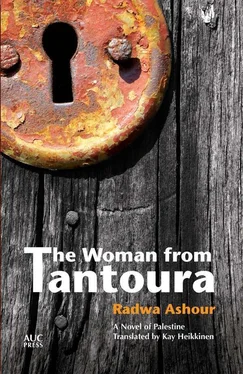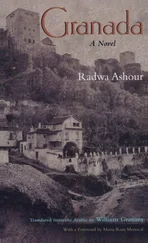When we took the train to Alexandria I watched the land spread out like the palm of a hand, in neatly drawn rectangles and squares of cultivated land. No olives or almonds, fewer trees and a lot of planting. I thought, the land of Egypt goes with the river, a carpet beside a carpet; even its wildness has order and logic. She said, “They went to Egypt.” Like every mother, she wanted every step her boys took to be safe. Her imagination rushed to her aid, with land like a carpet.
On the outskirts of Alexandria Maryam began to sing “O Alexandria, how wondrous your sea” in a whisper, so I laughed and followed her, distractedly. I was looking at my watch. I had never taken a train before in my life, and Sadiq had warned me: “The Sidi Gaber Station is not the last one on the line. The train stops there only five minutes or maybe ten, and then goes on to the last station. The trip takes two hours and ten minutes; get ready before you arrive. Pick up the things you’ve put near you, you and Maryam, and ask a worker to get down the large bags you’ve given him; he’ll set them down for you as soon as the train arrives. At the station you’ll find the friend I told you about. I told him to make sure to be there waiting for you; he’ll take you and Maryam to the apartment. Here’s his telephone number; if you want anything, call him. Assuming that for any reason you don’t find him, then ask one of the porters to take your things on his cart and go with you to the taxi stand, outside the station. You’ll give the driver the address, and you have the key to the apartment. The building has seven floors and our apartment is on the fourth. As soon as you arrive call to let me know.”
Sadiq was laying out what we would and would not do. Maryam said that he was treating us as if we were children; he scolded her with a look and went on speaking.
When I got up from my seat in the train, Maryam said, “Mama, everyone is still seated in their places, they’ll laugh at us.” But I got up and she followed me. She was right, because we stood near the door of the carriage for a quarter of an hour before it was announced over the loudspeaker, “Sidi Gaber Station.” Five minutes later the train stopped. Maryam was laughing.
How do the years pass, how did they pass? In a flash or slowly, like a camel crossing a desert that stretches endlessly toward the horizon, before you, behind you, and on the left and right? What brings the desert to mind when I’m in Alexandria, living on a street where the buildings crowd together, and each one has several floors, with apartments and residents? The pedestrians and the cars in the street move in three lanes, one for the cars heading east, another for the opposite direction, and between the two, tramlines. I hear the friction of their wheels against the iron and the hissing of their brakes when they approach the station and stop, or begin to move again. Clamor all day long, beginning at daybreak and not subsiding until the wee hours of the night, when it leaves the city to the sea. I inhale the aroma of the sea even in the dark, without seeing it. I don’t see it; I hear its roar and the impact of its waves on the stone breakwaters along the shore. Where did the desert come from?
Maryam is engrossed in her study; she leaves in the morning and returns only in the afternoon, or sometimes in the evening. I wait for her return, I wait for her to complete her education so we can go back. Go back where? I don’t know; maybe to Sidon, if the children accept that. I don’t know anyone in Alexandria. No, that’s not so, I do — a nice neighbor here or there, the grocer, the butcher, the vegetable seller, and all the boys who work for them. Maryam’s friends, and sometimes their mothers; I invite the women to have coffee in my house, or I go to them. It may be the only visit, or it may be repeated from time to time. I make a pretext of any occasion or none at all, and invite Maryam’s classmates, boys and girls, to lunch or supper. Cleaning the house, shopping, and preparing the food is all done by an hour before noon, or sometimes two. What do I do with the rest of the hours of my day? I walk along the Corniche sometimes, then I become annoyed with the traffic, the clamor of the cars, their horns and their exhaust, and I go back home. Sometimes I go down to the beach; I take off my sandals and plunge into the sand with my bare feet, crossing it in a straight line toward the water. Then I stop, and give myself to the scent of the sea, to the splashing of the waves, to the salt and spray they scatter over my face and body, which somehow steal onto the tip of my tongue. I stay standing like that, watching; or else I go back a step or two and crouch down, or I don’t go back, I simply squat down as I used to do when I was only three, not yet daring to jump in the water. I squat at the door of the sea, or I walk, wandering, unaware, not thinking of anything. Just the damp sand refreshing my feet, the blueness with its embroidery of foam, the air laden with a familiar scent that steals through my dress and onto my body.
One morning I asked the building doorman if he knew the way to a nursery nearby. He said, “A nursery for decorative plants?” I found the expression odd, and said, “For plants.” He told me the way, and I went on foot. I came back by taxi, because I had bought seedlings, plastic pots, dirt, and extra fertilizer. When Maryam came home from school and saw what I’d bought she laughed and said, “Is the garden free, or is there a charge to go in?”
Sometimes I reflect on it and I think I am trying to deceive myself, to beguile the solitude and the wait; sometimes I forget to reflect, and become absorbed in the work of my little garden. I remember that my mother used to say that my uncle Abu Jamil’s wife had a green thumb. I was four or five when I heard the expression, so I began to look closely at Umm Jamil’s hands, every time I met her, searching for her green thumb. Her hands were wheat colored, a little darker than my own, so I thought that perhaps the thumb had been green and then returned to its natural color; or maybe it was green during times of the day when I didn’t see her, or at night when she was sleeping.
Would my mother have said I had a green thumb if she had seen my little garden? It was not a single garden, but rather three small ones; what had begun as a thought, the day I asked the doorman about a nearby nursery, had turned into a daily preoccupation. I planted geraniums in seven oblong containers that I hung on the railing of the balcony. Mallow flowers are suited to the climate in Alexandria, to its sun, and even in the winter they keep their leaves and their colors, a fiery red or a soft violet or a third color, somewhere between the other two. The mallow flowers were the first plants I bought, and the game attracted me. Later on I put two deep pots on one side of the balcony, where I planted two kinds of jasmine. Jasmine is like a girl, it grows quickly and then fills out. That was the first garden (I have loved that word for garden, jeneina , ever since I became aware that it’s the diminutive of janna , Paradise). The second garden was small: on the marble countertop in the kitchen, under the large window, were a pot of mint, one of basil, and one of sage (I thought they wouldn’t grow inside the house in a little pot, but they surprised me). There was also a sweet potato in a cup of water, which rooted and then produced leaves; I tied up the canes with string attached to small nails, and it climbed and spread with its green leaves over the wooden window frame. The third garden was at the entrance of the apartment just outside the door, to your left as you come in. It was all cactus, in seven pots of different sizes, large and small. There were different kinds, and they flowered once a year.
Читать дальше












